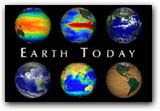| 
|
U.S. National Assessment of the Potential Consequences of Climate Variability and Change: Educational Resources |
Educational
Resources. Listing from the Center for International Earth Science
Information Network (CIESIN).
Global Change
and Environmental Education. Extensive list of link to education resources,
maintained by the Global Change Research Information Office (GCRIO).
| Lesson
Plans. Links to lesson plans posted on sites ranging from
the New York Times to National Geographic. |
Department of Energy (DOE)
 Homeroom. Education site sponsored by U.S. Department of Energy's
ARM Program (ARM stands for Atmospheric Radiation Measurement"). (link verified 8 Oct 2007) Homeroom. Education site sponsored by U.S. Department of Energy's
ARM Program (ARM stands for Atmospheric Radiation Measurement"). (link verified 8 Oct 2007)
DOE Office
of Biological and Environmental Research Global Change Education Program (link verified 8 Oct 2007)
Environmental Protection Agency (EPA)
EPA Climate Change Site (links verified 8 Oct 2007)
National Aeronautics and Space Administration (NASA)
WWW
Servers with Educational Materials about Earth Science and Global Change.
From the Global Change Master Directory, maintained by NASA's Goddard
Space Flight Center.(link verified 8 Oct 2007)
NASA Education
Programs (link verified 8 Oct 2007)
 For
Kids Only This site maintained by NASA's Earth Science Enterprise
site will show you how different NASA missions study Earth's air, land,
natural disasters, water. Plus
you can find out where the Terra satellite is right now.
It's worth a look even if you aren't a kid.
(link verified 8 Oct 2007) For
Kids Only This site maintained by NASA's Earth Science Enterprise
site will show you how different NASA missions study Earth's air, land,
natural disasters, water. Plus
you can find out where the Terra satellite is right now.
It's worth a look even if you aren't a kid.
(link verified 8 Oct 2007)
NASA Science Learning. Earth-Sun System Science section of this page includes links to:
(link verified 8 Oct 2007)
- Earth and Space Science Education E-News is a free monthly email newsletter about upcoming educational programs, events, opportunities and resources.
- The Earth Explorers Series is a monthly series that will introduce you to NASA Earth Explorers, young and old, with a variety of backgrounds and interests.
- Earth Science Education Catalog provides information about Agency-wide Earth-Sun science education programs and resources for elementary through university levels.
- Education Product Review is a biannual review of NASA's Earth science education materials. Included is an overview of the review process, guidelines for product development, criteria used for evaluation, and a list of "outstanding" products recommended for distribution by NASA's ESE.
- The GLOBE Program is a worldwide network of students, teachers, and scientists taking scientifically valid measurements in the fields of atmosphere, hydrology, soils, and land cover/phenology.
- The Sun-Earth Connection Education Forum stewards Sun-Earth Connection science resources. Their website features an extensive Resource Directory, containing hundreds of "ready-to-go" classroom activities and products that have been extensively field tested and evaluated. The site also provides links collections of images, movies and artwork
Our
Mission to Planet Earth: A Guide to Teaching Earth System Science [PDF]. Guide (published 1999) for grades K-4.(link verified 8 Oct 2007)
Goddard
Space Flight Center: Education Programs.(link verified 8 Oct 2007)
Goddard
Institute for Space Studies: Education.(link verified 8 Oct 2007)
Jet
Propulsion Laboratory, Educational Outreach.(link verified 8 Oct 2007)
Earth
Observatory, Reference Section.(link verified 8 Oct 2007)
| Scientist
for a Day. "Dr. Kevin Czajkowski, professor of geography
at the University of Toledo...and a team of researchers developed
an educational outreach program, funded by the NASA New Investigator
Program, that enabled teachers and students to collect data for a
global change study. Feature (25 April 2002) from NASA Earth
Observatory. (link verified 8 Oct 2007) |
National Oceanic and Atmospheric Administration (NOAA)
Teacher
Resources. From NOAA Constituent Affairs.(link verified 8 Oct 2007)
Education.
Site maintained by NOAA. Includes: (links verified 8 Oct 2007)
- Climate Change and Our Planet
National
Weather Service, Education Links.(link verified 8 Oct 2007)
Education
& Outreach: Paleoclimatology. (link verified 8 Oct 2007)
National Science Foundation
GEO
Education. Geosciences education site maintained by the NSF's
Directorate for Geosciences (GEO).
NSF
Establishes Five New Centers to Develop Teaching Leadership in Science
and Mathematics. Press release (dtd 23 Oct 2002) from the National
Science Foundation. (link posted 17 November 2002)
Smithsonian Institution
 Forces
of Change. Forces of Change is a new program about
the dynamics of global change at the Smithsonian's National Museum of
Natural History. Includes: Forces
of Change. Forces of Change is a new program about
the dynamics of global change at the Smithsonian's National Museum of
Natural History. Includes:
 Looking@Earth.
"The Looking at Earth gallery first opened to the public May 8, 1986
in the National Air and Space Museum [NASM] on the Mall in Washington,
D.C. It documents the changing ways that we have viewed our planet from
above. This online version is part of an ongoing effort by the NASM web
site to create a `virtual' representation of each of the physical galleries
of the museum. Each completed online gallery brings as much information
as possible from the the physical gallery to the internet visitor." Looking@Earth.
"The Looking at Earth gallery first opened to the public May 8, 1986
in the National Air and Space Museum [NASM] on the Mall in Washington,
D.C. It documents the changing ways that we have viewed our planet from
above. This online version is part of an ongoing effort by the NASM web
site to create a `virtual' representation of each of the physical galleries
of the museum. Each completed online gallery brings as much information
as possible from the the physical gallery to the internet visitor."
 Earth
Today. Museum and online exhibition. "Viewing
the Earth from space, we can observe how its atmosphere, oceans, landmasses,
and life interact as global systems. Using advanced computer technology
and visualization techniques, Earth Today displays data from Earth
orbiting satellites in near real time, giving an up to date picture of
conditions on our planet. " Earth
Today. Museum and online exhibition. "Viewing
the Earth from space, we can observe how its atmosphere, oceans, landmasses,
and life interact as global systems. Using advanced computer technology
and visualization techniques, Earth Today displays data from Earth
orbiting satellites in near real time, giving an up to date picture of
conditions on our planet. "
| 
Ocean
Planet. "Ocean Planet, premiered at the Smithsonian
Institution's National
Museum of Natural History from April 1995 to April 1996, where
it attracted nearly two million visitors. This electronic online
companion exhibition contains all of the text and most of the panel
designs and images found in the traveling
exhibition." |
US Geological Survey (USGS)
The Learning
Web. "Dedicated to K-12 education and lifelong learning.
Explore things on, in, around and about the Earth, such as land, water,
plants, animals and maps."
Educational
Resources for Cartography, Geography, and Related Disciplines.
University Corporation
for Atmospheric Research
As a consortium of universities
dedicated to education and research to enrich our understanding
of the earth system, UCAR manages the National Center for Atmospheric
Research (NCAR) and the UCAR Office of Programs (UOP).
K-12
Education
UCAR
Global Change Instruction Program Explore
the Atmospheric Sciences. Newsletter of Informal
Education at the University Corporation for Atmospheric Research
/ National Center for Atmospheric Research (UCAR/NCAR)
LEARN:
Atmospheric Science Explorers. LEARN "began in 1991
with funding from the National Science Foundation (NSF) to help
fill the critical need of science teacher professional development."
It's goal was "to increase middle school science teacher knowledge
of and interest in the atmospheric sciences...Much of the instructional
and science content foundation for the LEARN workshops came from
the teaching modules developed by LEARN teachers in collaboration
with more than 60 NCAR scientists.... As LEARN was nearing completion,
a number of the teachers suggested that it would be useful to have
a Web site based on the modules so that the information would be
widely available to all." |
Sites Sponsored by Others
Ancient Ice, Cool Science: Climate Change in the North. Internet
resources related to an exhibit at the Peary-MacMillan Arctic Museum and
Arctic Studies Center (Bowdoin College, Maine).
Atmosphere, Climate &
Environment Information Programme. The program is supported
by is the UK Department for Environment, Food and Rural Affairs (DEFRA)
to "disseminate information, without advocacy or bias, on the causes,
effects of and controls on air pollution and climate change, within the
framework of national legislation and international discussion."
Includes Information
and Teaching Resources section with Global
Climate Change Student Information Guide, information sheets and teaching
& activity resources. (link posted 22 May 2003)
Climate
Change Information Kit. Set of 30 information sheets (updated
1999) from the United Nations. Also available as PDF document.
Earth
Science Education Resources. From the Department of Physics/Astronomy,
Western Washington State University.
Energy
Quest. Energy education site from the California Energy
Commission. Among the offerings is the Greenhouse
Effect Science Project.
EXPLORES!
Teacher's Resource Guide. From Florida State University, Department
of Meteorology.
Frank Potter's
Science Gems. "Great links to great science resources."
Global
warming education. From the UK Department of the Environment,
Transport and the Regions.
 Global
Learning and Observations to Benefit the Environment.
"GLOBE is a worldwide hands-on, primary and secondary school-based
science and education program." GLOBE is a cooperative effort
of schools, led in the United States by a Federal interagency program
in partnership with over 140 colleges and universities, state and local
school systems, and non-government organizations. Internationally, GLOBE
is a partnership between the United States and 95 other countries. Global
Learning and Observations to Benefit the Environment.
"GLOBE is a worldwide hands-on, primary and secondary school-based
science and education program." GLOBE is a cooperative effort
of schools, led in the United States by a Federal interagency program
in partnership with over 140 colleges and universities, state and local
school systems, and non-government organizations. Internationally, GLOBE
is a partnership between the United States and 95 other countries.
 Government
of Canada: Government
of Canada:
Government of Germany
Government of the United Kingdom
K-12 Education.
From the Sea Grant Marine Advisory Program, Virginia Institute of Marine
Science.
|

Archived webcast that took place in the Monteverde
Cloud Forest of Costa Rica, 1-12 February 2002. "The multi-media
web production will include photo galleries and articles focusing
on major climate change issues as well as observations made by citizens
over time that offer evidence of global warming. In addition, resources
are offered for K-12 teachers and students, and Mercury Rising is
presented as a distance learning and continuing education course
for teachers through The
Heritage Institute and Antioch University." |
Metropolitan
East Coast Assessment Education Module. A "a package of
GIS software, datasets and lesson plans designed for educators who are
interested in using GIS technology to explore global climate change issues."
From
National Science Teachers
Association
One Sky,
Many Voices. "A project to create innovative inquiry-based
K-12 science curricula that utilize current technologies such as CD-ROMs
and the World Wide Web for Interactive Study."
ScienceNetLinks. "Providing a wealth of resources for K-12 science educators, Science NetLinks is your guide to meaningful standards-based Internet experiences for students."
Temperature
Rising. "Simon Fraser University, the Government of Canada,
the Greater Vancouver Regional District, and the Government of B.C., together
with other partners, have developed information material on the science
of climate change. The Temperature Rising poster and activity kit
are designed for B.C. grade 10 to 12 audiences with curriculum links to
subjects such as Geography, Earth Sciences, and Social Studies."
Weather
Education. From The Weather
Channel. |